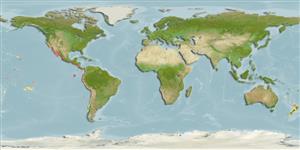>
Anguilliformes (Eels and morays) >
Ophichthidae (Snake eels) > Ophichthinae
Etymology: Ophichthus: Greek, ophis = serpent + Greek, ichthys = fish (Ref. 45335); zophochir: Name from Greek zophochi meaning dark hand, referring to the dusky pectoral fin (Ref. 4525).
More on authors: Jordan & Gilbert.
Environment: milieu / climate zone / depth range / distribution range
Ecologia
marino demersale; distribuzione batimetrica 1 - 110 m (Ref. 31243). Subtropical
Eastern Pacific: Eureka in northern California, USA to Peru; uncommon in north of Baja California, Mexico.
Size / Peso / Age
Maturity: Lm ? range ? - ? cm
Max length : 98.0 cm TL maschio/sesso non determinato; (Ref. 96339); common length : 50.0 cm TL maschio/sesso non determinato; (Ref. 55763)
Short description
Chiavi di identificazione | Morfologia | Morfometria
Vertebre: 149 - 162.
Inhabits rocky and sandy areas. A burrowing species. Feeds on clams and fish (Ref. 4525).
Life cycle and mating behavior
Maturità | Riproduzione | Deposizione | Uova | Fecundity | Larve
Eschmeyer, W.N., E.S. Herald and H. Hammann, 1983. A field guide to Pacific coast fishes of North America. Boston (MA, USA): Houghton Mifflin Company. xii+336 p. (Ref. 2850)
IUCN Red List Status (Ref. 130435: Version 2024-1)
Threat to humans
Harmless
Human uses
Pesca: di nessun interesse
Strumenti
Special reports
Download XML
Fonti Internet
Estimates based on models
Preferred temperature (Ref.
123201): 17.6 - 28.6, mean 23.4 °C (based on 122 cells).
Phylogenetic diversity index (Ref.
82804): PD
50 = 0.5000 [Uniqueness, from 0.5 = low to 2.0 = high].
Bayesian length-weight: a=0.00085 (0.00045 - 0.00162), b=3.01 (2.84 - 3.18), in cm total length, based on LWR estimates for this species & (Sub)family-body (Ref.
93245).
Trophic level (Ref.
69278): 3.9 ±0.60 se; based on food items.
Generation time: 3.7 ( na - na) years. Estimated as median ln(3)/K based on 1
growth studies.
Resilienza (Ref.
120179): Medio, tempo minimo di raddoppiamento della popolazione 1.4 - 4.4 anni (K=0.30).
Fishing Vulnerability (Ref.
59153): Moderate vulnerability (45 of 100).
